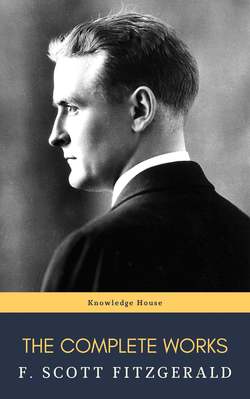Читать книгу The Complete Works of F. Scott Fitzgerald - F. Scott Fitzgerald, Knowledge house - Страница 47
На сайте Литреса книга снята с продажи.
“Ha-Ha Hortense!”
Оглавление“All right, ponies!”
“Shake it up!”
“Hey, ponies—how about easing up on that crap game and shaking a mean hip?”
“Hey, ponies!”
The coach fumed helplessly, the Triangle Club president, glowering with anxiety, varied between furious bursts of authority and fits of temperamental lassitude, when he sat spiritless and wondered how the devil the show was ever going on tour by Christmas.
“All right. We’ll take the pirate song.”
The ponies took last drags at their cigarettes and slumped into place; the leading lady rushed into the foreground, setting his hands and feet in an atmospheric mince; and as the coach clapped and stamped and tumped and da-da’d, they hashed out a dance.
A great, seething ant-hill was the Triangle Club. It gave a musical comedy every year, travelling with cast, chorus, orchestra, and scenery all through Christmas vacation. The play and music were the work of undergraduates, and the club itself was the most influential of institutions, over three hundred men competing for it every year.
Amory, after an easy victory in the first sophomore Princetonian competition, stepped into a vacancy of the cast as Boiling Oil, a Pirate Lieutenant. Every night for the last week they had rehearsed “Ha-Ha Hortense!” in the Casino, from two in the afternoon until eight in the morning, sustained by dark and powerful coffee, and sleeping in lectures through the interim. A rare scene, the Casino. A big, barnlike auditorium, dotted with boys as girls, boys as pirates, boys as babies; the scenery in course of being violently set up; the spotlight man rehearsing by throwing weird shafts into angry eyes; over all the constant tuning of the orchestra or the cheerful tumpty-tump of a Triangle tune. The boy who writes the lyrics stands in the corner, biting a pencil, with twenty minutes to think of an encore; the business manager argues with the secretary as to how much money can be spent on “those damn milkmaid costumes”; the old graduate, president in ninety-eight, perches on a box and thinks how much simpler it was in his day.
How a Triangle show ever got off was a mystery, but it was a riotous mystery, anyway, whether or not one did enough service to wear a little gold Triangle on his watch-chain. “Ha-Ha Hortense!” was written over six times and had the names of nine collaborators on the programme. All Triangle shows started by being “something different—not just a regular musical comedy,” but when the several authors, the president, the coach and the faculty committee finished with it, there remained just the old reliable Triangle show with the old reliable jokes and the star comedian who got expelled or sick or something just before the trip, and the dark-whiskered man in the pony-ballet, who “absolutely won’t shave twice a day, dog-gone it!”
There was one brilliant place in “Ha-Ha Hortense!” It is a Princeton tradition that whenever a Yale man who is a member of the widely advertised “Skull and Bones” hears the sacred name mentioned, he must leave the room. It is also a tradition that the members are invariably successful in later life, amassing fortunes or votes or coupons or whatever they choose to amass. Therefore, at each performance of “Ha-Ha Hortense!” half-a-dozen seats were kept from sale and occupied by six of the worst-looking vagabonds that could be hired from the streets, further touched up by the Triangle make-up man. At the moment in the show where Firebrand, the Pirate Chief, pointed at his black flag and said, “I am a Yale graduate—note my Skull and Bones!”—at this very moment the six vagabonds were instructed to rise conspicuously and leave the theatre with looks of deep melancholy and an injured dignity. It was claimed though never proved that on one occasion the hired Elis were swelled by one of the real thing.
They played through vacation to the fashionable of eight cities. Amory liked Louisville and Memphis best: these knew how to meet strangers, furnished extraordinary punch, and flaunted an astonishing array of feminine beauty. Chicago he approved for a certain verve that transcended its loud accent—however, it was a Yale town, and as the Yale Glee Club was expected in a week the Triangle received only divided homage. In Baltimore, Princeton was at home, and every one fell in love. There was a proper consumption of strong waters all along the line; one man invariably went on the stage highly stimulated, claiming that his particular interpretation of the part required it. There were three private cars; however, no one slept except in the third car, which was called the “animal car,” and where were herded the spectacled wind-jammers of the orchestra. Everything was so hurried that there was no time to be bored, but when they arrived in Philadelphia, with vacation nearly over, there was rest in getting out of the heavy atmosphere of flowers and grease-paint, and the ponies took off their corsets with abdominal pains and sighs of relief.
When the disbanding came, Amory set out posthaste for Minneapolis, for Sally Weatherby’s cousin, Isabelle Borgé, was coming to spend the winter in Minneapolis while her parents went abroad. He remembered Isabelle only as a little girl with whom he had played sometimes when he first went to Minneapolis. She had gone to Baltimore to live—but since then she had developed a past.
Amory was in full stride, confident, nervous, and jubilant. Scurrying back to Minneapolis to see a girl he had known as a child seemed the interesting and romantic thing to do, so without compunction he wired his mother not to expect him … sat in the train, and thought about himself for thirty-six hours.
